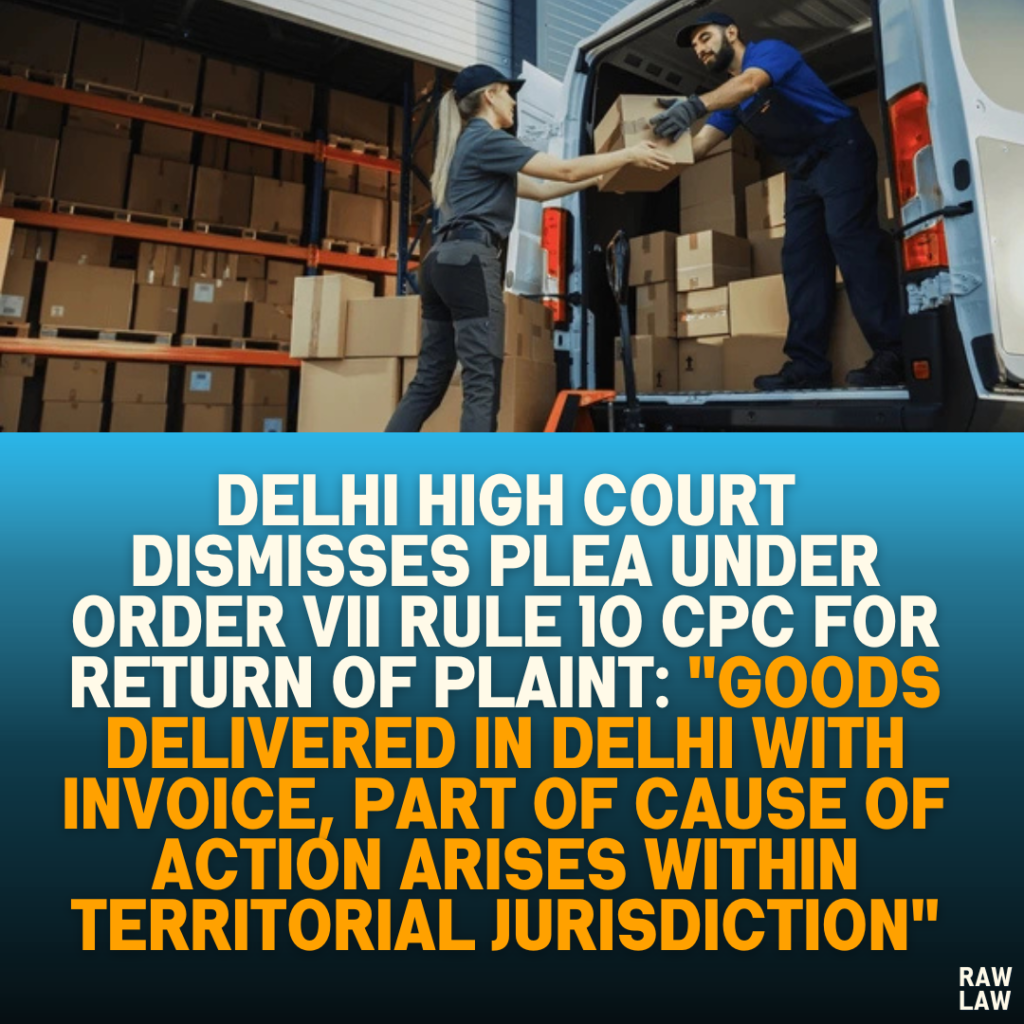Court’s Decision
The Delhi High Court dismissed an application under Order VII Rule 10 of the CPC seeking return of plaint for want of territorial jurisdiction. The Court held that the goods were delivered in Delhi along with a proper invoice and therefore part of the cause of action arose within its territorial jurisdiction. The Court held:
“As per the invoice placed on record, a total of 91 units of the defendant’s goods were delivered by the defendant in Delhi along with the invoice. Therefore, it cannot be said that the supply of goods by the defendant was not a commercial transaction.”
The application was found to be without merit and was accordingly dismissed.
Facts
The plaintiffs instituted a suit seeking a permanent injunction to restrain the defendant from infringing registered designs, trademarks, and patents. The first plaintiff owns several registered designs, while the second plaintiff is the proprietor of the trademark “SUESSEN” and a suit patent.
In December 2022, a representative of the plaintiffs discovered the defendant’s goods at the India ITME Exhibition in Greater Noida, which appeared to be similar to the plaintiffs’ goods. A subsequent investigation was initiated.
An investigator of the plaintiffs contacted the defendant via email in April 2023 and later visited the defendant’s premises in Coimbatore in May 2023. The investigator placed an order, and goods were delivered to an address in Delhi with an invoice dated 17th May 2023. Some samples were also provided. The delivery and invoicing in Delhi formed the basis of invoking territorial jurisdiction.
Issues
- Whether the Delhi High Court had territorial jurisdiction to entertain the suit under Section 20(c) CPC.
- Whether the delivery of goods in Delhi constituted a part of the cause of action.
- Whether the transaction constituted a trap purchase or a bona fide commercial transaction.
Petitioner’s (Defendant’s) Arguments
- The defendant is based in Coimbatore and has no office, dealer, or business operations in Delhi.
- The transaction in question was a one-time “trap purchase” by the plaintiffs’ investigator.
- The sale was completed in Coimbatore and not in Delhi; the goods were merely shipped to Delhi on the buyer’s request.
- The transaction was not commercial in nature and was done under deceit to generate jurisdiction.
- Reliance was placed on Banyan Tree Holding v. A. Murali Krishna Reddy and Indovax v. Merck Animal Health to argue that such transactions do not confer jurisdiction.
Respondent’s (Plaintiffs’) Arguments
- The defendant participated in a national-level trade exhibition in Greater Noida and marketed products targeting North India, including Delhi.
- The invoice and delivery of 91 units of goods in Delhi show a commercial transaction.
- The ordering company Ukandin had its registered office in Delhi at the relevant time.
- The transaction was not a mere trap but a valid sale supported by commercial documentation.
- Reliance was placed on Machinefabrik Rieter v. Tex Tech Industries, where similar facts were upheld to constitute part of the cause of action in Delhi.
Analysis of the Law
The Court reiterated that in an application under Order VII Rule 10 CPC, only the averments in the plaint and the documents filed with it need to be examined, treating them as true.
It was noted that:
- The plaintiff had clearly pleaded that the defendant exhibited goods in Greater Noida, interacted with the investigator via email, and delivered goods to Delhi with proper invoices.
- Section 20(c) of the CPC allows jurisdiction where part of the cause of action arises.
Precedent Analysis
The Court followed the ruling in Machinefabrik Rieter v. Tex Tech Industries, where:
“Goods were delivered in Delhi. As per the plaint, the contract was completed in Delhi as the defendant supplied the goods in Delhi and also raised an invoice/delivery note at Delhi.”
Banyan Tree was distinguished as it related to online transactions and website accessibility, not offline sales. The Court observed that:
“Banyan Tree… was a case of online presence. The present case is a case of offline transaction.”
Similarly, Indovax was distinguished as the facts in that case did not involve actual delivery and commercial scale of goods in the concerned jurisdiction.
Court’s Reasoning
- The delivery of 91 units in Delhi supported by an invoice establishes a commercial transaction.
- The defendant’s participation in an exhibition in Greater Noida indicated business interest in the region, including Delhi.
- Even if the transaction was initiated by the plaintiffs’ investigator, the defendant did not refuse to transact or restrict delivery to a particular region.
- The pleadings and documents establish that part of the cause of action arose in Delhi.
Conclusion
The Court held:
“At this stage, it cannot be held that the defendant did not intend to do business in Delhi.”
Accordingly, the application under Order VII Rule 10 CPC was dismissed.
Implications
This judgment reinforces that territorial jurisdiction in intellectual property infringement suits can be invoked where even a single commercial transaction takes place within the forum’s territory. Courts will consider the delivery of goods and the existence of a commercial invoice as sufficient to establish part of the cause of action. Attempts to escape jurisdiction by labeling transactions as “trap purchases” will be strictly scrutinized and must be backed by substantial evidence.




Pingback: Supreme Court Dismisses Contempt Petitions Against Karnataka Government — Orders Immediate Release of DRCs/TDRs in Favour of Complainants, Rejects Karnataka Government’s Attempt to Delay Compliance - "Judicial Orders Cannot Be Stifled by Procedur
Dear rawlaw.in admin, You always provide great resources and references.